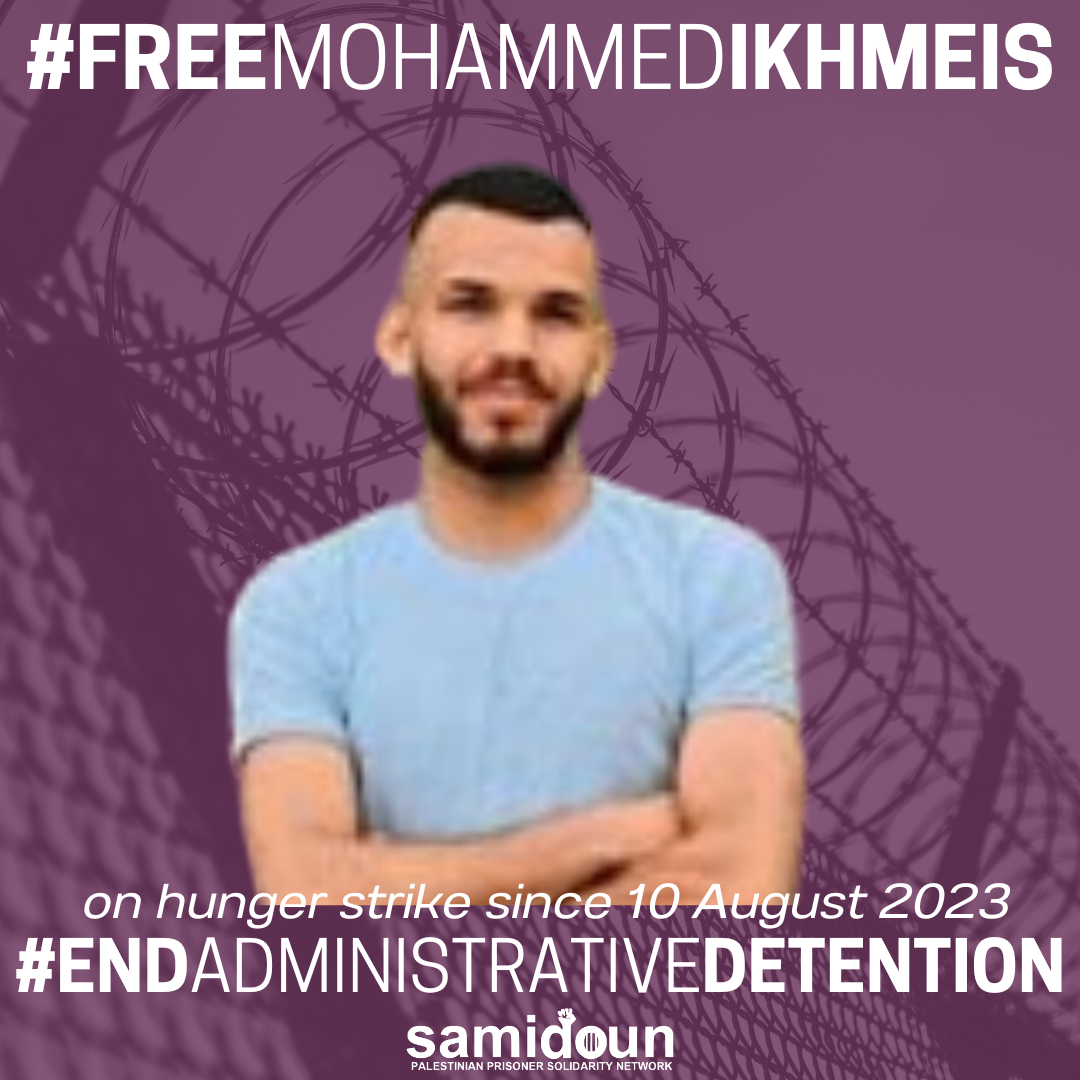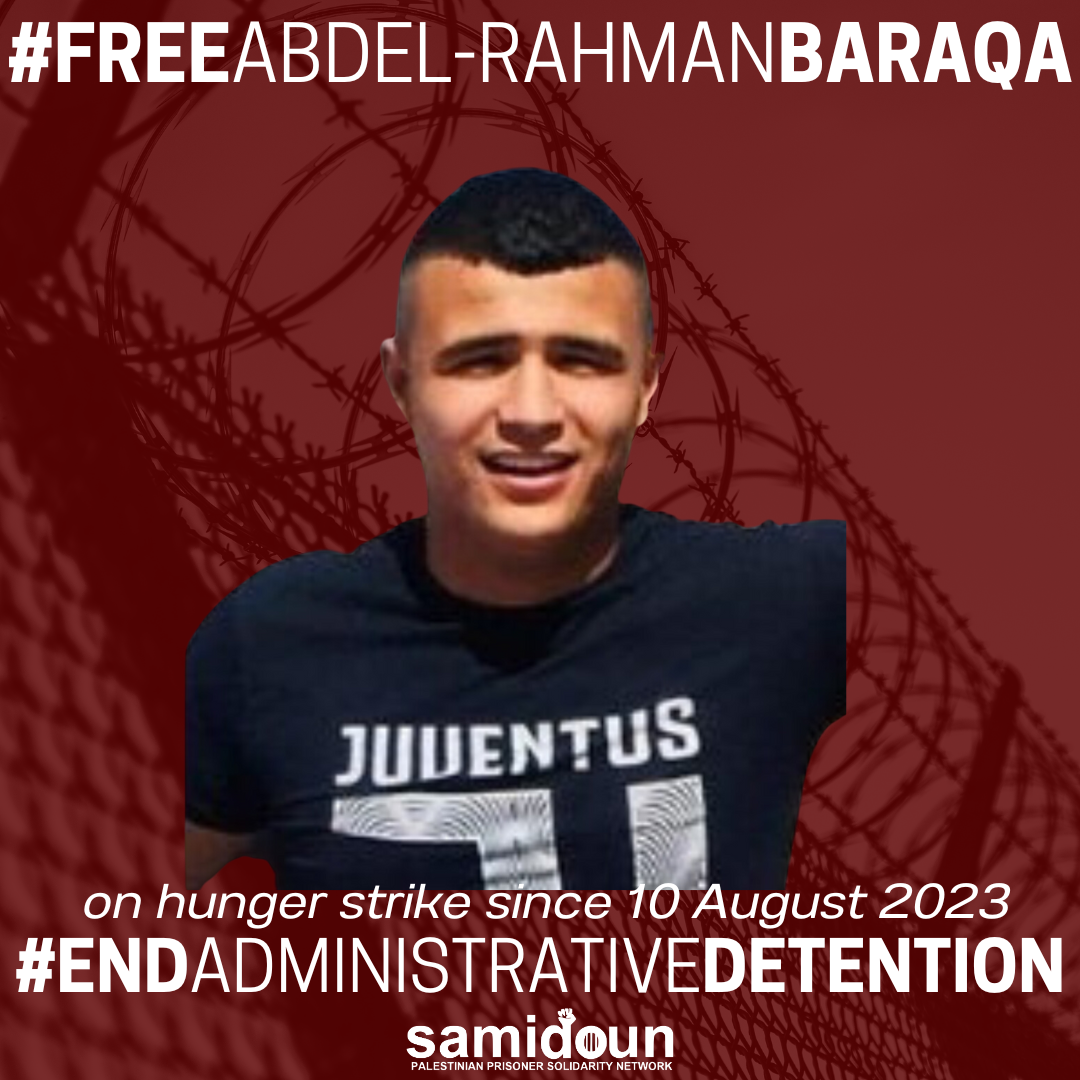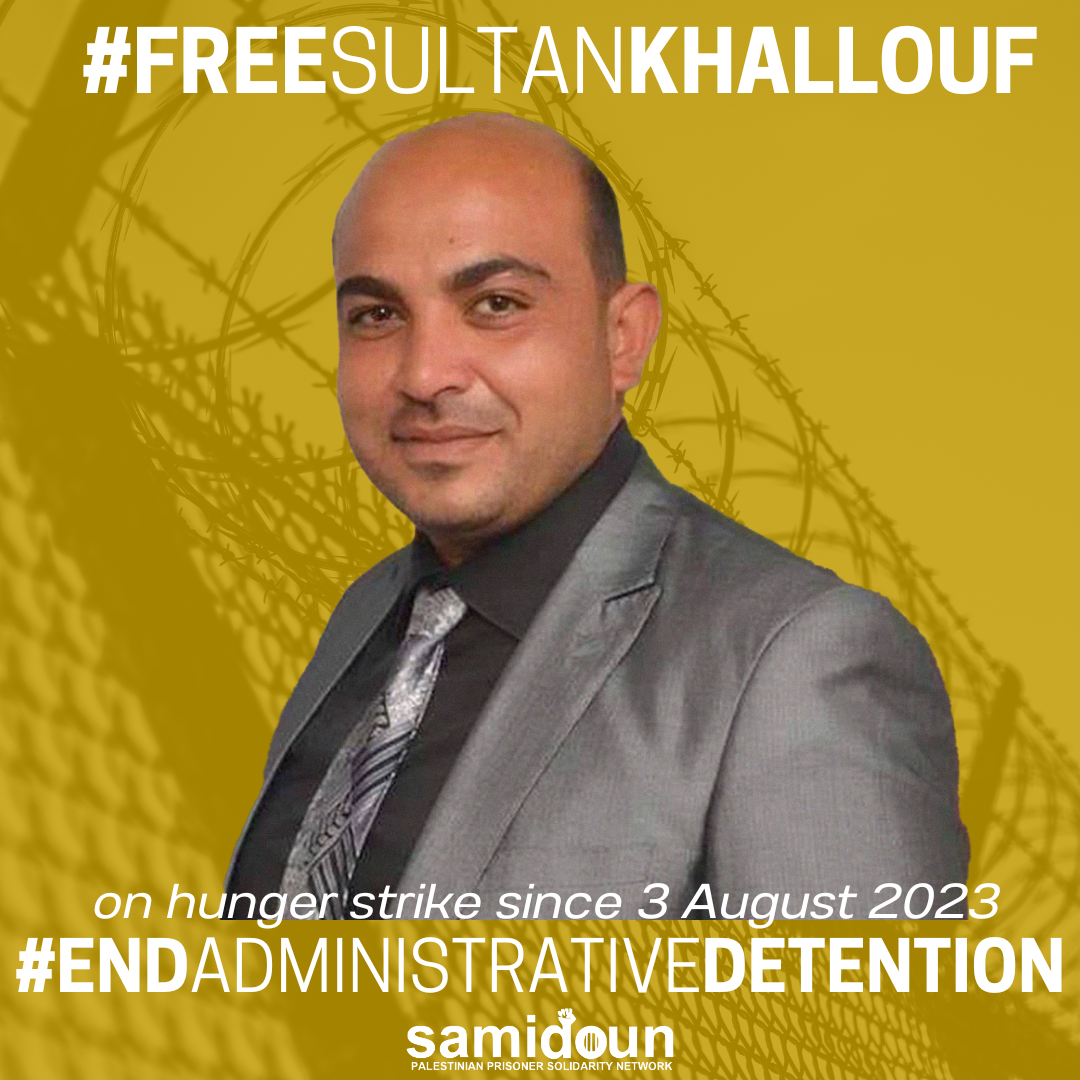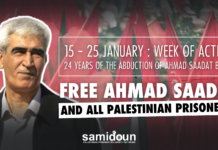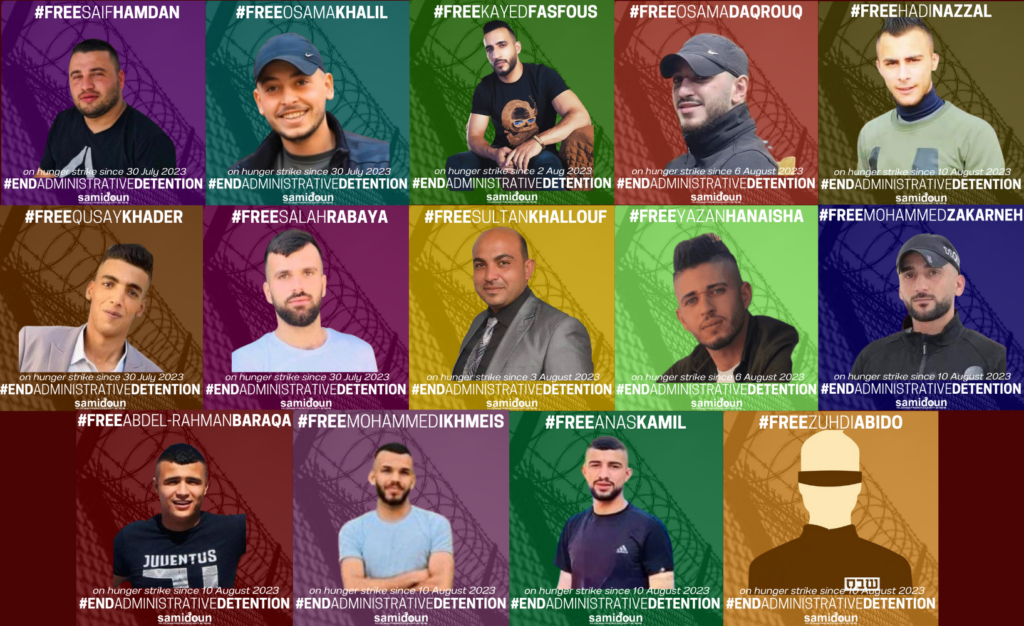
As the struggle continues inside occupation prisons for justice and liberation, there are currently 14 Palestinian prisoners engaged in an open hunger strike to demand freedom from administrative detention, imprisonment without charge or trial. There are over 1100 Palestinians jailed without charge or trial under such orders, over one-fifth of all Palestinian prisoners (approximately 5,000) including 19 children and three women, and over 2000 administrative detention orders have already been issued in the past year. The escalation of Israeli arbitrary detention to its highest point in 20 years is accompanied by ongoing raids and assaults on Palestinian prisoners, including the use of isolation and solitary confinement as a further form of torture and abuse against imprisoned Palestinians.
Eight more Palestinian prisoners have joined the hunger strike demanding freedom; on 6 August, Osama Daqrouq, from Salfit, who has been detained since 13 January 2023, joined the strike to demand an end to his continued arbitrary imprisonment without charge or trial under administrative detention, as did Yazan Hanaisha, 24, from Qabatiya, near Jenin. Hanaisha has been detained for three months and was ordered to six months in administrative detention without charge or trial. On Thursday, 10 August, a further group of six prisoners joined the strike:
- Hadi Naji Nazzal, Mohammed Tayseer Zakarneh and Anas Ahmad Kamil, all from Qabatiya, near Jenin, detained since May 2023
- Abdel-Rahman Iyad Baraqa, from Aqabat Jaber camp near Jericho, detained since April 2023
- Mohammed Bassem Ikhmeis, from Beit Ummar near al-Khalil, detained since November 2022
- Zuhdi Talal Abido, from al-Khalil, detained since March 2023
They join Sultan Khallouf and Kayed Fasfous who have been on hunger strike for 10 days, and Saif Hamdan, Osama Khalil, Salah Rabaya and Qusay Khader, all of who have been on hunger strike for 16 days.
Palestinian prisoners are also continuing to resist persecution, targeting and isolation and are being further retaliated against for their actions. On Sunday, 13 August, the Handala Center announced that Munther Khalaf Mufleh, director of the Handala Center and a member of the Central Committee of the Popular Front for the Liberation of Palestine, had suddenly been seized by occupation forces and taken to an unknown location. This comes one day after prisoners of the PFLP continued their protest steps, wearing prison uniforms to signal their willingness for confrontation on Saturday, 12 August. The prisoners are demanding that Wael Jaghoub, who was transferred to isolation in Salmoun on 31 July — and then transferred again to isolation in Megiddo prison on 9 August — be released from solitary confinement along with other prominent leaders taken to interrogation including Nader Sadaqa, Hikmat Abdel-Jalil and Ahmad al-Ardah.
Also on Sunday, 13 August, prisoners in the Naqab desert prison declared a state of emergency against repressive, abusive “searches” and arbitrary transfers, amid a high state of tension inside the prison after occupation forces stormed section 26 in the prison, ransacking the prisoners’ belongings and transferring them arbitrarily to another section.
What Is Administrative Detention?
Administrative detention was first used in Palestine by the British colonial mandate and then adopted by the Zionist regime; it is now used routinely to target Palestinians, especially community leaders, activists, and influential people in their towns, camps and villages.
There are currently approximately 1132 Palestinians jailed without charge or trial under administrative detention, out of nearly 5,000 Palestinian political prisoners, the highest number in 20 years.
Administrative detention orders are issued by the military and approved by military courts on the basis of “secret evidence”, denied to both Palestinian detainees and their attorneys. Issued for up to six months at a time, they are indefinitely renewable, and Palestinians — including minor children — can spend years jailed without charge or trial under administrative detention. Hundreds of Palestinians have gone on hunger strike to win their liberation from this form of arbitrary detention, which is not only illegal under international law but a form of psychological torture and collective punishment targeting Palestinian families and communities, as detainees are unable to predict or plan for their release.
Samidoun Palestinian Prisoner Solidarity Network urges all supporters of Palestine to take action to support the Palestinian hunger strikers and all Palestinian prisoners struggling for freedom, for their own lives and for the Palestinian people. These sons of the Palestinian popular masses are confronting the system of Israeli oppression on the front lines behind bars, with their bodies and their lives, to bring the system of administrative detention to an end. With over 1100 Palestinians jailed without charge or trial — over 20% of all Palestinian prisoners — the struggle to bring down administrative detention is more urgent than ever. Take these actions below to stand with the hunger strikers and the struggle for liberation of Palestine, from the river to the sea!
Download these signs for use in your campaigns:
- Poster/Sign: End Administrative Detention
- Poster/Sign: Free Hunger Strikers and All Prisoners
- Poster/Sign – End Administrative Detention (with Palestinian Flag)
TAKE ACTION:
Protest at the Israeli Embassy or Consulate in Your Country!
Join the many protests taking place around the world — confront, isolate and besiege the Israeli embassy or consulate in your city or country of residence. Make it clear that the people are with Palestine! Send us your events at samidoun@samidoun.net.
Take to the streets: Organize a protest in solidarity with Palestine!
Take to the streets and join actions for justice! Organize your own if there is none in your area, and send us your events at samidoun@samidoun.net.
Boycott Israel!
The international, Arab and Palestinian campaign to boycott Israel can play an important role at this critical time. Local boycott groups can protest and label Israeli produce and groceries, while many complicit corporations – including HP, G4S, Puma, Teva and others, profit from their role in support Zionist colonialism throughout occupied Palestine. By participating in the boycott of Israel, you can directly help to throw a wrench in the economy of settler colonialism.
Demand Your Government Sanction Israel!
The racist, settler colonial state of Israel and its war crimes against the Palestinian people are enabled and backed extensively by the over $3.8 billion each year given to Israel by the United States — targeted directly to support the Israeli occupation military killing children, women, men and elders throughout occupied Palestine. From Canada to Australia to the European Union, Western governments and imperialist powers provide ongoing diplomatic, political and economic support to Israel as well as selling billions of dollars of weaponry to the settler-colonial state. Meanwhile, they also purchase billions of dollars in weaponry from the Israeli state. Governments in league with imperialist powers, such as in the Philippines, Brazil, India and elsewhere, also buy weapons and “security” services — all “battle-tested” on the Palestinian population. Call your representatives, MPs, political officials and demand your government sanction Israel now, cut off all aid, expel its ambassadors, and stop buying and selling weapons!
Discover more from Samidoun: Palestinian Prisoner Solidarity Network
Subscribe to get the latest posts sent to your email.







